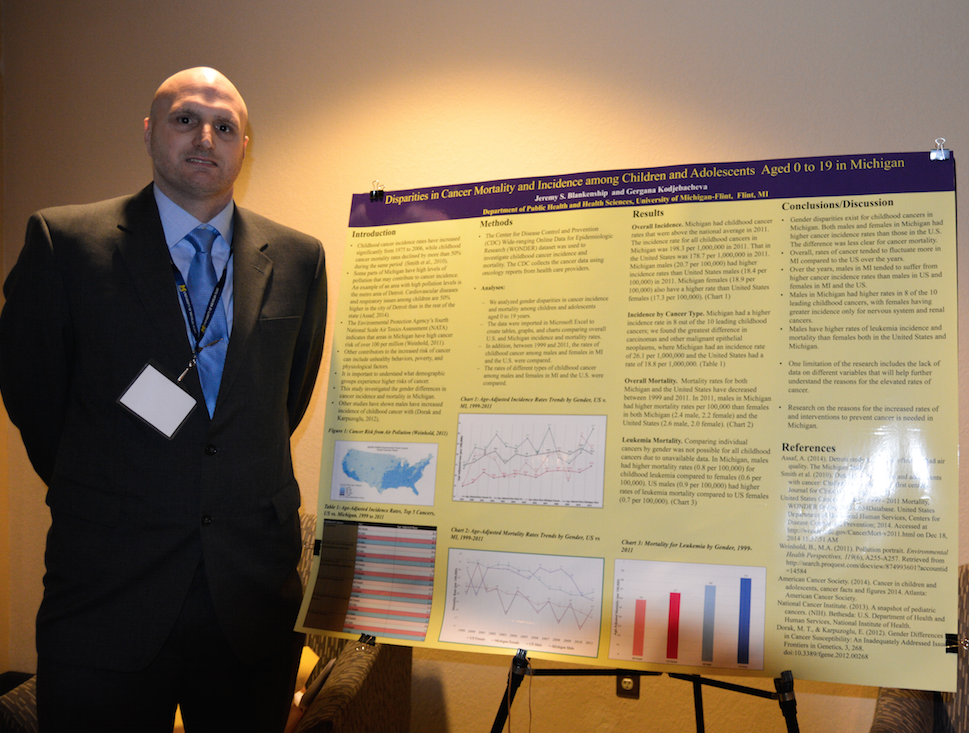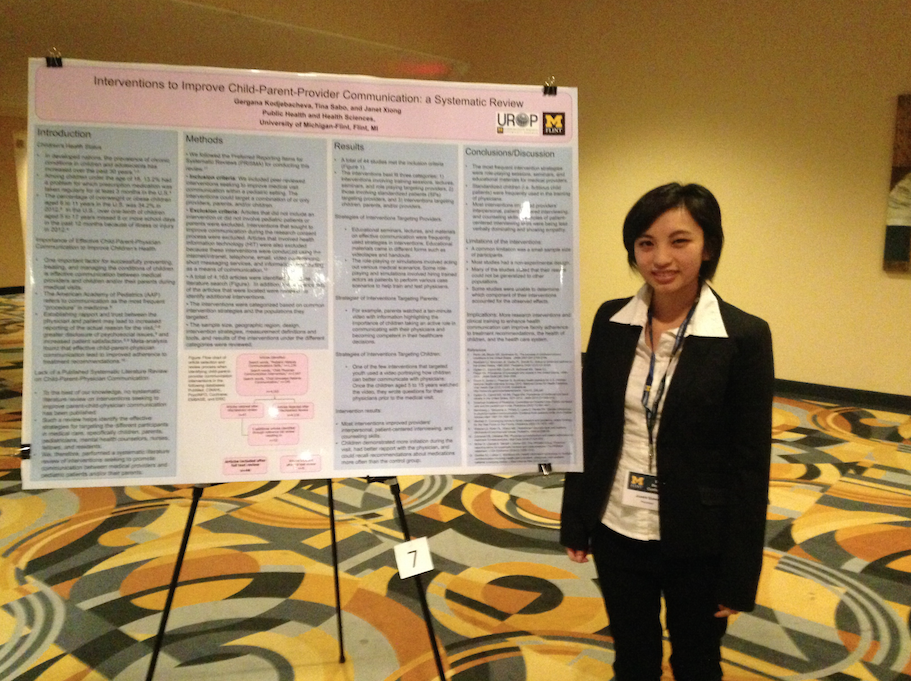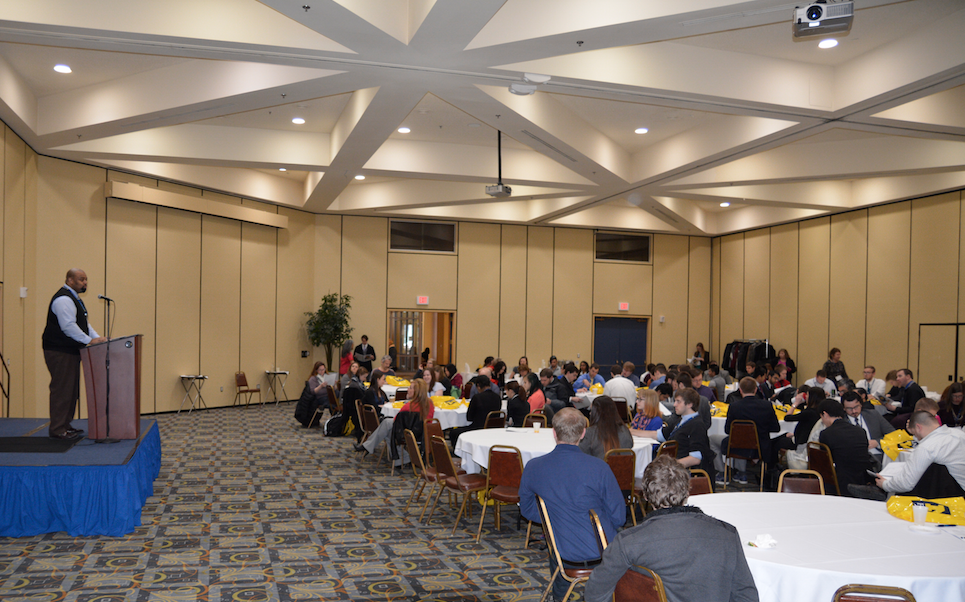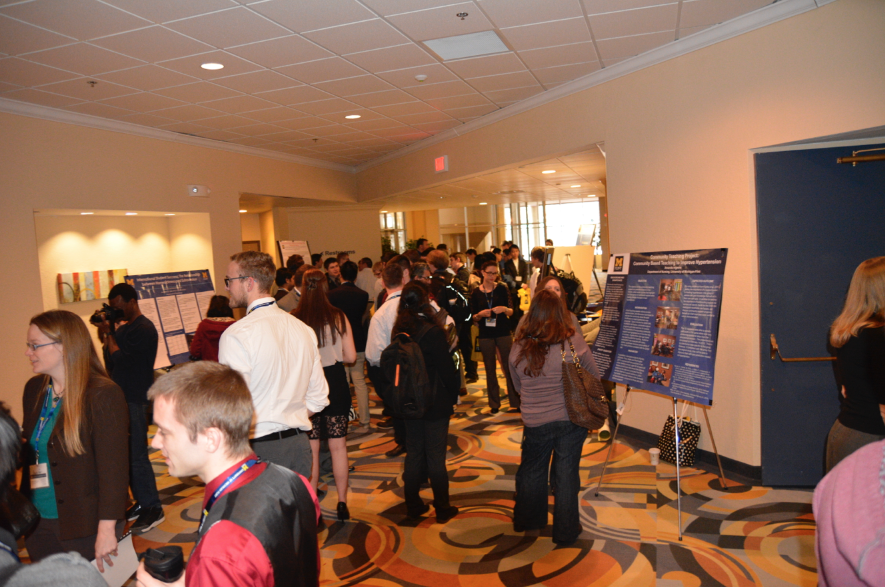Each year, the UM-Flint Student Research Conference (SRC) provides the opportunity for UM-Flint undergraduate and graduate students to share their faculty-mentored research, scholarship, and creative activities. The conference showcases multi-disciplinary research from the arts, humanities, social sciences, natural sciences, and applied sciences. Students present their scholarly work either in 15-minute oral presentations, hour-long poster sessions, demonstrations, or performances. Additionally, student presenters have the opportunity to have their manuscripts published in the annual conference proceedings.
This year’s Student Research Conference took place on March 27, 2015 at the Riverfront Event Center on campus, and Public Health and Health Science student and conference participant Janet Xiong, took time to give us an overview of the event! Check out her story below…
My experience at the Student Research Conference (SRC) was intriguing. I was able to not only present my research project, but learn about the research that other students were involved in. I was able to attend an oral presentation and view the poster of several projects. I feel that the oral presentations was such a great component to this conference, because there was great discussion generated and slide presentations that were visually appealing and informative. The posters sessions were an interactive way for students to share about their research as well as gain the knowledge about other students’ research projects.
I created a poster to showcase the research project I have worked on alongside Dr. Gergana Kodjebacheva. The research is titled “Interventions to Improve Child-Parent-Provider Communication: a Systematic Review.” The purpose of this research was to review literature that has implemented interventions to improve the communication between a child, parent, and provider. Communication is a crucial factor in producing effective health systems in medical and clinical environments. In pediatric care, we aimed to discover the communication interventions that have been implemented so far. We researched on six different databases (PubMed, CINAHL, PsychINFO, Cochrane, EMBASE, and ERIC). 4,163 articles later, we found that 37 of these studies were aligned with our criteria. Each of these studies had varying sample sizes, designs, target groups, and intervention strategies.
After reviewing each study, we found that many studies targeted the provider and/or parent with the communication interventions, but very rarely, was there studies that targeted children. Interventions targeting providers, such as role-playing sessions, seminars, and educational materials for medical providers, hoped to improve providers’ interpersonal, patient-centered interviewing, and counseling skills. Interventions targeting parents, such as receiving instructions or information prior to a health situation involving their child and family-centered rounds, intended to improve parent satisfaction, communication, and/or treatment expectation. We found only one study that worked to improve the communication of children–by having them watch videos that showed effective communication between a child and a physician. The videos were used to help the children imitate the communicative behaviors of talking about their health.
The implication of my research project with Dr. Kodjebacheva is the implementation of more interventions and clinical training to enhance health communication among children, parents, and providers, and hence, improving the health care system.
After my poster presentation, there were closing remarks by Andre Louis, who was an important planner of the event. Then, a nice lunch was availble to all student researchers, which was a great way to relax and absorb the opportunity we were all given–to share and learn about research. Overall, my experience at the SRC was a enjoyable and I am sure that all students and faculty involved felt the same!
Janet was joined fellow PHHS student Jeremy Blankenship who also presented at the conference. Jeremy’s project and a summary of his experience can be found below:
Project Title: Disparities of Incidence by Race and Ethnicity for Childhood Cancer in Michigan Presenter(s): Jeremy Blankenship, Graduate student Faculty Sponsor(s): Gregana Kodjebacheva, Public Health and Health Sciences
“The Student Research Conference was the first time that I have been able to present scholarly research outside of the classroom. The experience was extremely valuable to me. I proved to myself that I could work as a part of a research team with Dr. Gergana Kodjebacheva and present it in a professional scholarly manner. My confidence level is so much higher now that I have successfully presented at the Student Research Conference.
Dr. Kodjebacheva has gone out of her way to assist me in developing research skills by answering all my questions, giving me feedback, suggesting improvements, or helping me with SPSS. Working with Dr. Kodjebacheva as a Graduate Research Assistant and working on childhood cancer research has influenced my decision to pursue a second masters degree in public health and to pursue other research opportunities in the future.”

For more information on the Student Research Conference, as well as a program with listings on more details on the projects from Janet and Jeremy please click here!


